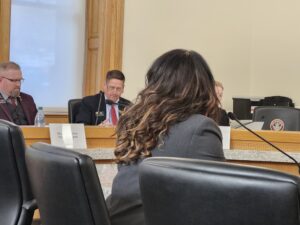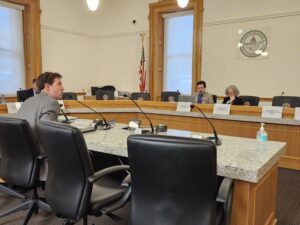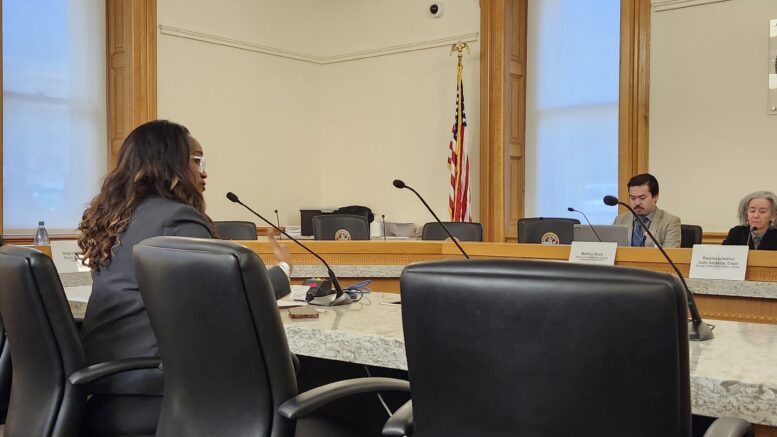Hotels, restaurants, event promoters and other businesses may soon have to disclose all mandatory fees in the price they advertise for products from rooms to concert tickets, as a Colorado bill to ban “junk fees” is moving through the Legislature.
The House Business Affairs and Labor Committee on Wednesday advanced the bill to the full chamber on a Democrat-led, party-line vote, riding an increasing wave of consumer anger at fees that can add sometimes $10 to $30 to the cost of a good or service. Several members complained of having to deal themselves with fees that didn’t present themselves until the last minute, and business leaders said they agreed with the transparency premise of House Bill 1151 but worried about some of its details.
Under the proposal from Rep. Naquetta Ricks, D-Aurora, businesses would have to include all non-discretionary fees that they charge in the advertised price of a product or be subject to a claim of a deceptive trade practice, which can lead to significant financial penalties. Among other cost, these include resort fees that more hotels are adding to bills, processing fees that individuals pay when buying event tickets and restaurant service fees, according to Danny Katz, executive director of the Colorado Public Interest Research Group (CoPIRG).
Junk fees exacting rising costs
Ricks cited research from Consumer Reports showing that more than one-third of Americans have paid these junk fees on concert tickets, personal banking transactions, telecom services and other common costs. And she noted that the same organization estimated that such fees now cost the average American family $3,200 per year.
“This is about improving price transparency so Coloradans can choose goods and services that meet their budgets,” she said. “This is going to protect Colorado consumers and create more honest businesses in Colorado.”
Few, if any, groups, have come out against the bill, but a slew of business associations are monitoring it because of its potential widespread impact on companies. According to Ruthie Barko — executive director for Colorado and the Central U.S. for TechNet, a technology industry interest group — it’s not the principle of HB 1151 that bothers firms so much as how it will be implemented on state-specific basis.

Colorado state Rep. Mike Lynch questions Rep. Naquetta Ricks about her “junk fees” ban in committee on Wednesday.
Qualms — but not opposition — from business
Many technology officials would prefer to see a national solution rather than state-by-state piecemealing, and the Federal Trade Commission already has taken the step of proposing a rule to ban junk fees, Barko said. HB 1151 needs clarity to ensure prohibitions don’t apply to business-to-business transactions or to subscription fees required of many services, and it would help if legislators pushed its proposed mid-August implementation date back to mid-2025, she argued.
“This bill will result in significant compliance costs for businesses of all sizes, so we do want to make sure we get this right,” Barko said.
The bill, which largely mimics a California law scheduled to go into effect in July, contains exemptions for several industries regulated by the federal government or other sections of state government, including airlines, banks/credit unions and motor vehicle dealers. And it allows restaurants — and, thanks to an amendment added on Wednesday, breweries — to promulgate their service charges that boost pay to back-of-the-house staffers on menus or tabletops rather than having to add them into the price of each individual menu item.
Exemptions lead to questions
Ricks also added an amendment Wednesday that exempts Denver hotels from having to list in their advertised prices a lodging fee imposed by an industry-led special district, and this seemed to push frustrations for Rep. Mike Lynch, R-Wellington, over the top. Lynch said those hidden hotel fees are some of the most frustrating junk fees for consumers and asked pointedly who the bill is targeting if there are so many costs being exempted from it.
The bill also exempts taxes or government-imposed fees from having to be added into the advertised price of goods and services, as well as postage charges.
“There is all kinds of silliness going on with this bill,” Lynch added before he and the other two Republicans on the committee voted against HB 1151, in opposition to its seven Democratic supporters. “I just really think the free market could take care of this on its own.”
If not the free market, then the state government already is starting to tackle the issue even without a law in place. The Colorado Sun reported that the Colorado Attorney General’s Office reached a settlement with a third different hotel chain earlier this month to stop hiding non-discretionary fees.
How could ban on junk fees affect competition?

Danny Katz, executive director of the Colorado Public Interest Research Group (CoPIRG), testifies Wednesday for the proposed “junk fees” ban.
Katz, whose organization was the primary driver behind the legislation, said in an interview that the fees have gained attention as they have cropped up in more places, particularly as more goods and services are sold online and come with fees tacked onto orders. Colorado could become the fifth state to pass such a law — though none of the others have implemented it yet — and, he argued, could help to level the playing field between companies that openly list such fees now and those that don’t.
“Markets only work when consumers can shop around. If you don’t shop around, then that’s where scenarios come up where consumers can get ripped off,” he said. “What we want is a world in which companies are competing based on the quality of their products and their prices … It’s very difficult to have that done when the true cost of a product can be hidden until consumers are ready to check out.”
The bill is likely to continue moving forward in the legislative process, possibly in a more under-the-radar fashion as business groups save their biggest fights for proposals that will boost air-quality regulations on sectors from oil and gas to manufacturing. Maybe the biggest question remaining, then, is whether it will be written into law in a way that is efficient for fee-charging businesses to implement or whether it will sow confusion as part of a growing patchwork of state laws.
